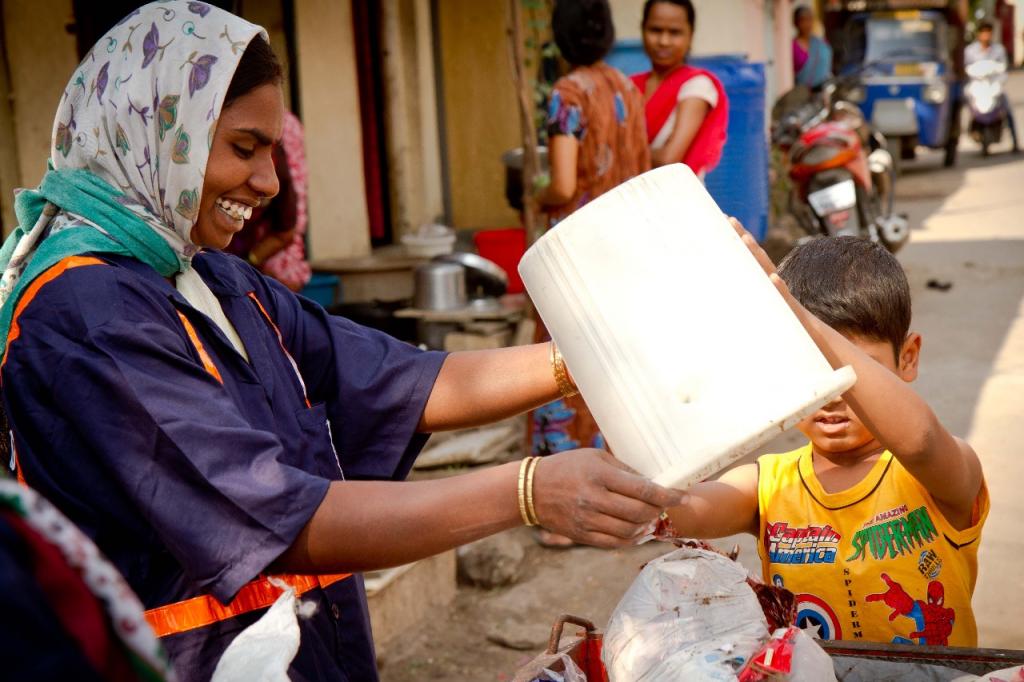As India urbanises rapidly, its urban slums face mounting challenges. From poverty and overcrowding to inadequate sanitation, waste management in these densely populated areas is often overlooked from poverty and overcrowding to inadequate sanitation. However, a quiet revolution is underway, driven by circular economy principles, innovative organisations, and determined communities, transforming waste into opportunities.
The Waste Crisis in India
India generates approximately 3.5 million tonnes of plastic waste annually, ranking among the highest globally (CPCB, 2020). Shockingly, 70-80% of municipal solid waste (MSW) is indiscriminately dumped in open spaces, leading to health hazards, water contamination, and greenhouse gas emissions. Urban slums like Dharavi in Mumbai, Govindpuri in Delhi, and Lingarajapuram in Bengaluru bear the brunt of this crisis. These areas not only lack infrastructure but often become the epicentres of improper waste disposal.
Circular Economy to the Rescue
The circular economy aims to “close the loop” by minimising waste, maximising resource use, and turning by-products into valuable inputs. Unlike traditional linear economic models, the circular approach is particularly beneficial in slum communities where resources are scarce, but creativity abounds.
Dharavi: Mumbai’s Recycling Heartbeat
Often termed a “miniature circular economy,” Dharavi, one of Asia’s largest slums, is home to over 5,000 industrial units involved in waste recycling. Around 80% of Mumbai’s recyclable plastic, paper, and aluminium find their way to Dharavi.
1. Plastic into Profit: Businesses like AarohanaEcoSocial reuse single-use plastics to make durable handbags, mats, and laptop sleeves.
2. Community Impact: Over 2 lakh slum residents are directly employed in recycling, earning a livelihood while contributing to environmental sustainability.
3. Economic Footprint: Dharavi’s informal recycling industry generates ₹15,000 crore annually, an indicator of its potential for mainstream adoption.
Bengaluru: Empowering Waste Pickers with "Hasiru Dala"
“Hasiru Dala” (meaning Green Force) is an NGO leading the charge in Bengaluru. It empowers waste pickers, many of whom reside in slums, to be frontline waste managers.
1. Integration into Systems: Waste pickers are trained, formalised, and hired for solid waste management, diverting waste away from landfills.
2. Socio-Economic Benefits: Over 10,000 waste-picking families in Bengaluru now earn improved wages and live healthier lives.
3. Results: The initiative diverts over 50 tonnes of dry waste daily, significantly reducing municipal dumping costs.
Delhi: Bioenergy from Waste
Delhi’s slum-dwelling communities are pioneering bioenergy production through waste-to-energy plants and community composting.
1. Tackling Organic Waste: Areas like Govindpuri have adopted small-scale biogas systems that convert kitchen waste into cooking fuel, directly benefitting households.
2. Waste-to-Wealth Programs: The Delhi Jal Board collaborates with communities to turn slum-collected solid waste into biogas, saving ₹5 crore annually in energy costs.
3. Empowerment through Jobs: Slum residents managing these programs are trained as plant operators, providing them with steady incomes and skill development.
Benefits Beyond Waste Management
1. Improved Hygiene and Health
Waste-related illnesses account for 22% of India’s urban health burden, including ailments like diarrhoea, respiratory infections, and skin conditions. Efforts to manage waste in slums have led to better sanitation and public health outcomes. For example, initiatives in Bengaluru reduced dengue cases by 35% in affected areas.
2. Women and Youth Empowerment
Organisations like Saahas involve women in waste segregation, upcycling, and sales, fostering financial independence. Similarly, young people are being educated about circular economy principles, creating a generation committed to sustainability.
3. Environmental Sustainability
By diverting waste from landfills and promoting recycling, these initiatives mitigate greenhouse gas emissions and extend landfill lifespans. Bengaluru’s Hasiru Dala alone prevents 2,800 tonnes of CO2 emissions annually by recycling dry waste.
4. Employment Generation
According to the Ministry of Housing and Urban Affairs, scaling circular economy practices in waste management could generate 7 million jobs in India by 2030. Slum-focused models ensure these opportunities reach those who need them most.
Challenges to Scaling Circular Economies in Slums
Despite these successes, barriers exist:
- Informal Sector Inclusion: Over 2 million informal waste workers in India often face exclusion from formal waste systems.
- Lack of Policy Support: Policies like the Plastic Waste Management Rules (2016) are inadequately enforced.
- Funding Limitations: Most slum recycling initiatives rely heavily on grants and lack consistent financial backing.
How You Can Contribute
1. Reduce, Reuse, Recycle: Follow waste segregation norms at home to ease the burden on waste-picking communities.
2. Support Local Recycling Startups: Organisations like Aarohana and Saahas depend on consumer demand for sustainable goods.











.jpg)


